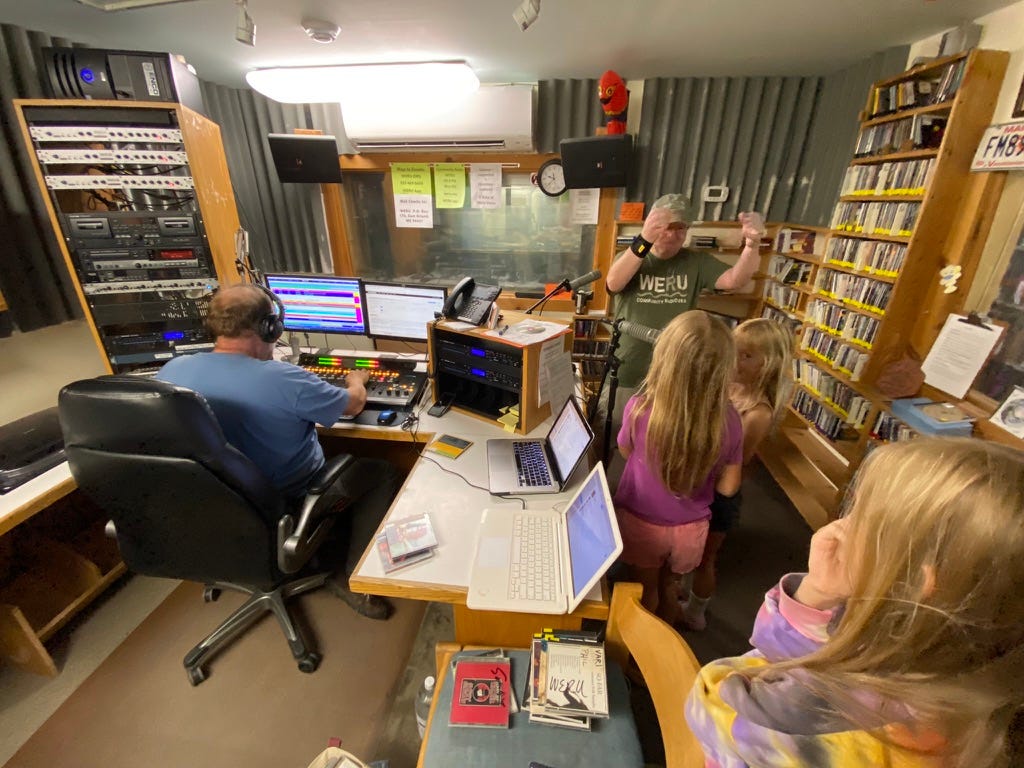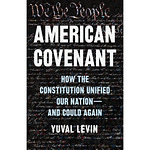This is a Builders conversation. I'm doing these about once a month to highlight people who are not just cursing the darkness but are also building up their local community — and the country — through making something beautiful, through problem-solving, and by stitching together places of belonging and meaning. (Thank you Joy Moore for the inspiration!)
It was cold outside. The car was warm. Our daughter's soccer game wouldn't start for 30 minutes. So Ali and I stayed in the car for a few minutes, chatting.
Ali stopped talking. "What are we listening to?" she asked.
It was Diana Krall's version of "A Case of You," the Joni Mitchell classic.
Ali was confused. Was I playing this on my phone? It's not the kind of music you'd hear on the radio.
But it was the radio. Community radio. DC's listener-supported radio station, WPFW, 89.3 FM (they play jazz most of the day on Sunday).
We listen to Maine's mid-coast community station, WERU, virtually every single day from the time we wake up, to sometime around midday. In the afternoons, I usually switch over at some point to New York City's WFUV, which is run out of Fordham University.
I do it, first and foremost, because they play damn good music. I'm not that interested in talk radio. I enjoy listening to people talk on podcasts. But talk radio? No thank you. Whether talk or music, commercial radio is a dead zone for me, largely bereft of anything new or creative.
WERU's mission statement is to: lift spirits, raise awareness, and make connections.
Lift spirits
Raise awareness
Make connections
And the remarkable thing about community radio stations — which are generally listener-supported and do not rely on business advertising for revenue — is that I do feel a connection to the places where I listen, to the point that parts of my psyche and imagination and my affections are there. So I am able to sustain a connection to Maine and to New York City that I love.
A few other stations we listen to: WWOZ out of New Orleans (especially during Mardi Gras); WPFW here in DC; KEXP in Seattle, and WXNA in Nashville.
These stations form some of the rituals that I look forward to each week. On Sundays, John Platt's Sunday Supper program often comes on as I preparing dinner for the family, and his wise, kind demeanor in between playing great tunes is something I really enjoy listening to as I cook. The program just after Sunday Supper, Cavalcade, keeps the great music going.
Fridays for an hour from 9 to 10 am, I know that WERU will be playing an hour of Bob Dylan songs, usually with a historic or thematic emphasis. Elaine Shute comes on WERU every two to three weeks on Mondays from 11 to 2, and every time I listen to her “On the Wing” show there are at least 3 or 4 songs that are off a new album or artist I didn't know about, or a song that's years old that I'd never heard before.
This past summer, we took our kids to visit WERU in Maine, which is near Acadia National Park. The station's General Manager, Matt Murphy, gave us a tour, and he even had our two youngest daughters do a brief on-air announcement in support of the station. We saw the floor to ceiling shelves of CD's and records, the small studio, and the kitchen, also filled with music.
I wanted to interview Matt for my Builders series because, as he says: “There's so much in the world that's challenging ... and all the hard times can have a certain degree of paralysis to them."
"And there's a lot of things in the world that I can't do anything about, but I can do a lot about making community radio a good environment for people to do their thing and serve the community," he told me. "So having something to do, that you feel can help make even a little bit of a difference, is really important."
That's exactly it. Having something to do to make even a little bit of difference is the cure for the ways that the bigger, broader world can make all of us feel hopeless and powerless sometimes.
“There's so much in the world that's challenging ... and all the hard times can have a certain degree of paralysis to them … So having something to do, that you feel can help make even a little bit of a difference, is really important."
WERU and WFUV in particular, and all the people who work and often volunteer their time there, bring me much joy and light. We gladly donate to them. I hope some of you who love music will check them out.
But I also hope conversations with people like Matt and Joel Searby give you a sense of agency, that there is something you can do to shine a little light.
Jon Ward: To me, community radio and WERU are important for two reasons. Music and beauty are a must for humans, and community radio is unlike commercial radio in that its top priorities are playing great music and building community rather than making money. And second, it builds that community and gives people a sense of place and I think it increases a feeling of gratefulness and investment in a place and its people. So how would you add to that? This is sort of your moment to spread the gospel of community radio.
Matt Murphy: One, we're non-commercial licensees of the FCC so that we don't have commercials. We have underwriting announcements, identifying businesses and organizations that are sponsoring the station that give money to the station, but they're limited in time and length and content.
Most community radio stations have a really big volunteer presence. And that's another a really big point that at WERU we have over a hundred people on the air in any given over a month's period as volunteers who are programming and producing DJs who do all their own programming of music, public affairs hosts who are in charge of their shows and short feature, short spoken word pieces that are again, volunteers, some of them writers, some of them educators, some of them people who simply are experts in an area that they have five minutes of content to produce every week and get those on the air.
We have a staff of eight people here at the who are in charge of different areas ... we're governed by a nonprofit board of directors.
It's really important for a community radio station not to have one format. We have, last count, something like 50 different genres of music on the air. When we survey our listeners periodically, diversity is always the top thing that people like about the station.
The listeners really care about the station. It's not just something they listen to. It's something that they value, and donate to of course. But we hear from a lot of people saying, wow, they take great pride that we have this in our community. And I think that feels really good to those of us who work inside the station.
Jon: How did you come to be at WERU?
Matt: Well, I moved to the area from another part of Maine when I was young and was working in a boat yard and started listening to the station almost immediately and really got turned on to it and started volunteering. And I was volunteering behind the scenes, the editing, the programmer guide, printed program guide, little newspaper that went out every month. And I got to know the station inside and out because of that. And it was five years of volunteering before I ever got on the air, and it wasn't my goal when I started.
Enthusiasm goes a long way. I really wasn't professionally qualified to do what they hired me to do, but I had some good mentors. And then a couple years after that, the general manager job opened up and I had some encouragement to apply for it from folks. I've been the general manager for 22 years.
I came along as a volunteer in 93, I believe. The station started in 88.
Jon: Who started the station?
Matt: It was a group of really dedicated volunteers who got turned on to the idea of a community radio station and started fundraising and et cetera. The famous person of our group was Noel Paul Stookey of Peter Paul and Mary. He lives in the area and was instrumental in both getting things going, the idea going, and also providing the first home for the station in his converted chicken coop or affectionately known as the hen house in Blue Hill Falls. And so he was very involved and gathered people around him who did a lot tons of work, people like David Snyder and people like Jim Campbell and others. David was an outreach mastermind and Jim managed other radio, so he knew the radio part of the game.
One of the basic motivators was there was something missing in the media for them, the ability to be involved with making media for and by the community and to hear things that they wanted to hear that you didn't get out there in the mainstream media. So whether it was reggae, bluegrass, you name it, some of the things that you didn't hear out in mainstream media that they want it to be on, they will want it to get on the air.
Jon: What drove you to walk up to the station and volunteer? What was it at its core?
Matt: It was I think first that caught my attention with the programming and then second, wanting to be part of it, wanting to be part of that community. You could hear and feel the community coming over the airwaves and I wanted to be in on that
Jon: One of the reasons for doing this whole builders series of conversations is to give people examples of people who are building, who are creating community, who are being constructive. And one of the challenges that I think anybody who is spending a lot of their time trying to move forward in life and build something positive faces, just like most people, is discouragement. If we go through difficult times — times when things seem like they're going the wrong direction or just like there's lots of bad news or there's setbacks — what gets you through those times? What do you lean on? How do you keep going through those times?
Matt: Well, I think that's a great question. During Covid and during other tough situations out there, we got lots of positive feedback and encouragement from listeners and volunteers get them also from other volunteers. And there's a real sense of, we're in this together and we're doing good work, and this is the role that we play and let's do that role as good as we can.
And we find out from hearing from people, what we feel inside anyways is that this is really important. In our mission statement, we say lift spirits, raise awareness and make connections. And we hear from people that those are really important things to them.
I mean, boy, there's so much in the world that's challenging. I feel very fortunate to be where I'm at, that I have something constructive like this to do that really feels worthwhile. It really makes a difference. And there's a lot of things in the world that I can't do anything about, but I can do a lot about making community radio a good environment for people to do their thing and serve the community.
And I think that having all the hard times can have a certain degree of paralysis to them. And so having something to do that you feel can help make even a little bit of a difference is really important. So when in doubt, do something. And I'm very fortunate to have this to do.
Why is David Barton still popular?
I e-mailed with historian John Fea this week for a piece I’m writing on David Barton, the favorite pseudo-historian of many conservative Christians.
Barton’s books have been discredited — by conservative Christians who are actual historians — as inaccurate and misleading histories of our nation’s founding, but he remains popular among many Americans.
I asked Fea why he thinks that is.
Fea is Distinguished Professor of American History at Messiah University, an evangelical college in Pennsylvania, and he is author of Was America Founded as a Christian Nation? (Another good resource on Barton in particular is the book that directly addresses the many problems with his book on Thomas Jefferson, Getting Jefferson Right: Fact-Checking Claims About Thomas Jefferson by Warren Throckmorton and Michael Coulter, both of whom were professors at a very, very conservative evangelical college — Grove City College — when they wrote this.)
Jon Ward: If Barton's work has been widely discredited, why has he remained so popular and influential?
John Fea: Hi Jon:
Don't get me started...
Since the 1980s, ordinary conservative evangelicals tend to see all of life through the lens of politics. The Moral Majority and Pat Robertson have done a masterful job of teaching them to think in this way. So historical facts that do not conform to present-day political agendas are not useful. Historical narratives that do not conform to a Christian nationalist view of the American founding are also not useful. Much of politics—including the politics of the Christian Right—is built on this search for a useable past and Barton gives the Christian Right this useable past. This is why he remains so popular. The entire Christian Right movement is built on Barton's view of history—that the United States was founded as a Christian nation (or Judeo-Christian ideas) and must be restored through the use of political power. As long as his narrative serves 21st-century political ends, then the facts, the context, and the complexity of the past do not matter.
I know of no Christian college or university history faculty who has a Ph.D in history who does not believe Barton's work is deeply problematic. And this includes the history faculty at Liberty University and Bob Jones University. He has been widely discredited. But that doesn't matter to rank-and-file evangelicals because Barton is giving them what they want to hear. This kind of evangelical populism—which has been empowered by Trumpism-- breeds anti-intellectualism which, in turn leads to a distrust in "experts." (See Tom Nichols's book The Death of Expertise). Barton is VERY good at discrediting mainstream historians—both Christian and non-Christian—by talking about how they went to graduate school at secular institutions and have been, in essence, brainwashed to believe anti-American or unpatriotic view of American history. Trained historians are the "elite" and can't be trusted. The more people debunk Barton's pseudo-history the more he is able to use such criticisms to paint himself as a victim, thus gaining more conservative evangelical followers who also see themselves as victims. Again, this is the essence of anti-intellectual populism, and it has plagued American evangelicalism for a long, long time.
I don't know the sources of Barton's funding, but I am guessing there are donors who keep his Wallbuilders shop afloat. These donors want to advance his Christian Right vision for America. The facts or the proper use of the past in the present doesn't matter to these donors. I imagine that most of these donors give money to Wallbuilders for political reasons, not humanistic reasons.
Here’s What’s Worth Remembering from This Week’s News
My weekly piece at Yahoo News is here.
Israel under pressure as casualties continue to mount
Congress avoids a shutdown, again
Biden and Xi attempt a reset
The Republican presidential field continues to shrink
Inflation is slowing and we might not need another rate hike
Interesting Reads
Jim Toole, cantankerous former owner of Capitol Hill Books, dies at 86 by Harrison Smith for The Washington Post
Jim Toole, a Navy rear admiral who commanded cruisers, destroyers and Mekong River patrol boats before taking charge of Capitol Hill Books, the Washington bookstore that became as well known for his endearingly grumpy presence at the front desk as for its stock of used and rare books, died Nov. 11 — Veterans Day — in the District. He was 86.
Adm. Toole owned the shop for more than two decades before selling it to a group of longtime employees in 2018. He was still working there until his death and had attended its monthly Second Saturday wine and cheese party before having a fatal heart attack later that evening, according to his daughter, Laura Torres.
“I wouldn’t be in it if I didn’t like it,” he told American University Magazine in 2017. “I spend 90 hours a week here either chasing after books or sitting in front of that desk. Pricing books, cleaning people’s boogers off of books, shelving books. It’s a major effort, but I’ve always felt in an area like the Hill, to not have a used bookstore is wrong.”
When Ruthless Cultural Elitism Is Exactly the Job by David Marchese for The New York Times
“You want to matter in this culture? Not me.”
Dean Phillips Has a Warning for Democrats by Tim Alberta for The Atlantic
Back on January 6, 2021, as he’d crawled for cover inside the House gallery—listening to the sounds of broken glass and the gunshot that killed the Trump supporter Ashli Babbitt, overhearing his weeping colleagues make goodbye calls to loved ones—Phillips believed that he was going to die. Later that night, reflecting on his survival, the congressman vowed that he would give every last measure to the cause of opposing Trump. And now, just a couple of years later, with Trump’s recapturing of power appearing more likely by the day, he was supposed to do nothing—just to keep the Democratic Party honchos happy?
“My colleagues, we all endured that, and you’d think that we would be very intentional and objective and resolute about the singular objective to ensure he does not return to the White House,” Phillips said. “We need to recognize the consequences of this silence.”
That’s all folks. Have a great weekend!













